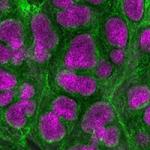
Research Topics
Mendelian principles have been the cornerstone for identifying nuclear genes in biological and diseases processes and ordering these genes into functional cascades. However, the limitation of Mendelian genetics to explain many complex traits has redirected attention beyond the nucleus. In addition to the nuclear genome, each eukaryotic cell contains hundreds to thousands of copies of mitochondrial genome, the small circular DNAs inside mitochondria. Mutations on mitochondrial genome often impair cellular energy homeostasis and have been linked to many diseases including various age-related disorders. Despite the immense impact of mtDNA mutations on health and disease, our understanding of mitochondrial genetics remains rudimentary. Genetic analyses on mitochondrial genome are complicated by the peculiarities of the mitochondrial genetic system that features maternal inheritance, polyploidy, and amitotic segregation.
We are working with fruit flies and other model organisms to understand the basic principles guiding the transmission of mitochondrial genome. We are trying to understand why evolution favors the transmission of mitochondrial genome from the maternal linage exclusively, how mothers limit the transmission of harmful mtDNA variants to their offsring, how organisms prevent the accumulation of mtDNA mutations in somatic tissues and with aging. We are also exploring the coordination and potential genetic conflicts between nuclear and mitochondrial genome, and their impact on health and diseases. Additionally, we are actively developing new tools to advance the genetic study of mtDNA.
Biography
Hong Xu graduated from Nankai University with a B.S. in 1995 and received a M.S. from Peking University in 1998. He earned his Ph.D. in 2004 from the Johns Hopkins University School of Medicine, where he worked with Craig Montell. Dr. Xu did his postdoctoral fellowship at the University of California, San Francisco with Patrick O’Farrell, during which time he received the Larry L. Hillblom Postdoctoral Fellowship. Dr. Xu joined NIH a tenure-track Investigator in 2010 and was promoted to senior investigator in 2017.
Selected Publications
- Hill JH, Chen Z, Xu H. Selective propagation of functional mitochondrial DNA during oogenesis restricts the transmission of a deleterious mitochondrial variant. Nat Genet. 2014;46(4):389-92.
- Zhang Y, Wang ZH, Liu Y, Chen Y, Sun N, Gucek M, Zhang F, Xu H. PINK1 Inhibits Local Protein Synthesis to Limit Transmission of Deleterious Mitochondrial DNA Mutations. Mol Cell. 2019;73(6):1127-1137.e5.
- Liu Y, Chen Z, Wang ZH, Delaney KM, Tang J, Pirooznia M, Lee DY, Tunc I, Li Y, Xu H. The PPR domain of mitochondrial RNA polymerase is an exoribonuclease required for mtDNA replication in Drosophila melanogaster. Nat Cell Biol. 2022;24(5):757-765.
- Wang ZH, Zhao W, Combs CA, Zhang F, Knutson JR, Lilly MA, Xu H. Mechanical stimulation from the surrounding tissue activates mitochondrial energy metabolism in Drosophila differentiating germ cells. Dev Cell. 2023;58(21):2249-2260.e9.
- Chen Z, Zhang F, Lee A, Yamine M, Wang ZH, Zhang G, Combs C, Xu H. Mitochondrial DNA removal is essential for sperm development and activity. EMBO J. 2025;44(6):1749-1773.
Related Scientific Focus Areas




Molecular Biology and Biochemistry
View additional Principal Investigators in Molecular Biology and Biochemistry
This page was last updated on Thursday, August 21, 2025